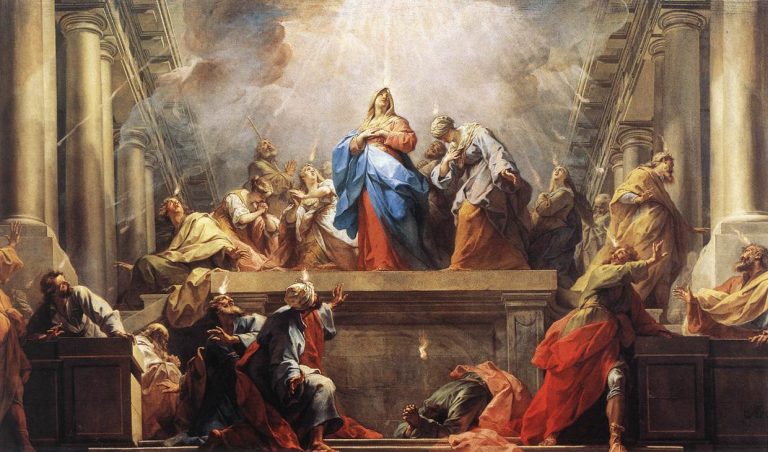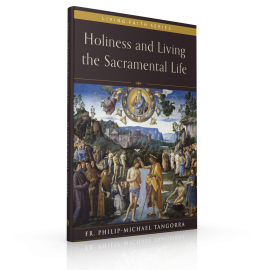By. Fr. Philip-Michael Tangorra

The Sacrament of Confirmation in both forms of the Roman Rite do not differ drastically. This sacrament should be administered within the context of Mass, but the extraordinary form commonly celebrates Confirmation, just like Matrimony, outside of and preceding Mass. The ordinary form also includes the renewal of the baptismal promises as part of the rite, so as to show the intimate connection with Baptism. In both the ordinary and extraordinary forms, the anointing with the sacred chrism and the consecratory prayer, with arms outstretched over the heads of the confirmands, are the form of this sacrament. These gestures, which are also the constitutive form of episcopal and priestly (presbyteral) ordination, highlight the fact that in Confirmation the confirmand receive the fullness of the common priesthood of Jesus Christ to share in the mission of the Church.
The Sacrament of Confirmation builds upon the foundational gifts and graces of Baptism and connects the recipient of this sacrament to the Church in order to serve and defend the Church: “By the sacrament of Confirmation they [the Baptized] are more perfectly bound (perfectius vinculantur) to the Church and are endowed with the special strength of the Holy Spirit.” As Baptism incorporates one into the Church and places upon them a sacramental character for the sake of sharing in the common priesthood of Christ Jesus and to offer right worship of God, Confirmation augments this sacramental character so that the recipient may share all the more in the common priesthood of Christ in order to be collaborators with the bishop and his priests to teach, govern, and sanctify.
The seven gifts of the Holy Spirit conferred in Confirmation are wisdom, understanding, counsel, fortitude, knowledge, piety, and fear of the Lord. These gifts are meant to aid spiritual growth as well as to be used for the benefit of others by building up the kingdom of God on earth through the promotion of the Catholic faith. Confirmation is the capstone upon the Easter sacraments, just as Pentecost is the capstone upon the imparting of the New Law in Christ Jesus begun on Easter. In the further and more perfect reception of the Holy Spirit and his sevenfold gifts at Confirmation, the baptized person is made a warrior of Christ, a knight of the Church, an evangelist, and a missionary. Made firm in the faith through instruction and nourished by the sacramental life of the Church, the confirmed is meant to use the gifts of the Holy Spirit to promote and defend the teachings of the Church, as the Code of Canon Law states: “By virtue of baptism and confirmation, lay members of the Christian faithful are witnesses of the gospel message by word and example of a Christian life; they can also be called upon to cooperate with the bishop and presbyters [priests] in the exercise of the ministry of the word.” The slight slap on the cheek by the bishop signifies that the confirmed will face the buffetings of the world for the sake of Christ Jesus and the proclamation of the good news of his Crucifixion and Resurrection, the kerygma, but that they have been made firm in the faith, hope, and love of Christ by this sacrament.
Pope Benedict XVI underscores the centrality of the Eucharist to all of the sacraments: “It must never be for gotten that our reception of Baptism and Confirmation is ordered to the Eucharist . . . The gifts of the Spirit are given for the building up of Christ’s Body (1 Cor 12) and for ever greater witness to the Gospel in the world. The Holy Eucharist, then, brings Christian initiation to completion and represents the centre and goal of all sacramental life.” While Confirmation is not necessary for the reception of the Eucharist, since we can receive as those “merely” baptized; yet as confirmed Christians our participation in the Eucharistic sacrifice at Mass ought to be enhanced as we offer ourselves more completely with the sacrifice of Christ upon the Cross in order to increase our share in the fruits of the Resurrection and Pentecost.
As a pilgrim people looking east, toward the event of the Resurrection, and awaiting the Second Coming, we are guided by the Holy Spirit, healed and reformed by the Sacrament of Penance, and nourished by the Eucharist. Our Confirmation increases within us the gifts of the Holy Spirit and more perfectly chains or binds us to the Church so we may be more perfectly nourished by it and serve it. We are meant to be stronger pilgrims on our spiritual journey because of Confirmation. Sent by the joy of the Resurrection and the power of the Holy Spirit at Pentecost, which is the event we experience again at Confirmation, we are meant to grow in holiness and help others to do so as we journey toward the Second Coming, the Parousia.
Fr. Philip-Michael Tangorra is the author of Holiness and Living the Sacramental Life from Emmaus Road Publishing. To discover how our understanding of theology and the practices of our Catholic faith can draw you closer to God, read Fr. Tangorra’s instructive book.
You Might Also Like
 In Holiness and Living the Sacramental Life, Fr. Philip-Michael Tangorra lays out the mystical and invisible realities that are present during the celebration of the sacraments and explains how they can lead us to living ever more in tune with God. Read how the sacraments aren’t empty ceremonies, but rather powerful, effective signs that bring grace crashing through the cosmos and into our world.
In Holiness and Living the Sacramental Life, Fr. Philip-Michael Tangorra lays out the mystical and invisible realities that are present during the celebration of the sacraments and explains how they can lead us to living ever more in tune with God. Read how the sacraments aren’t empty ceremonies, but rather powerful, effective signs that bring grace crashing through the cosmos and into our world.